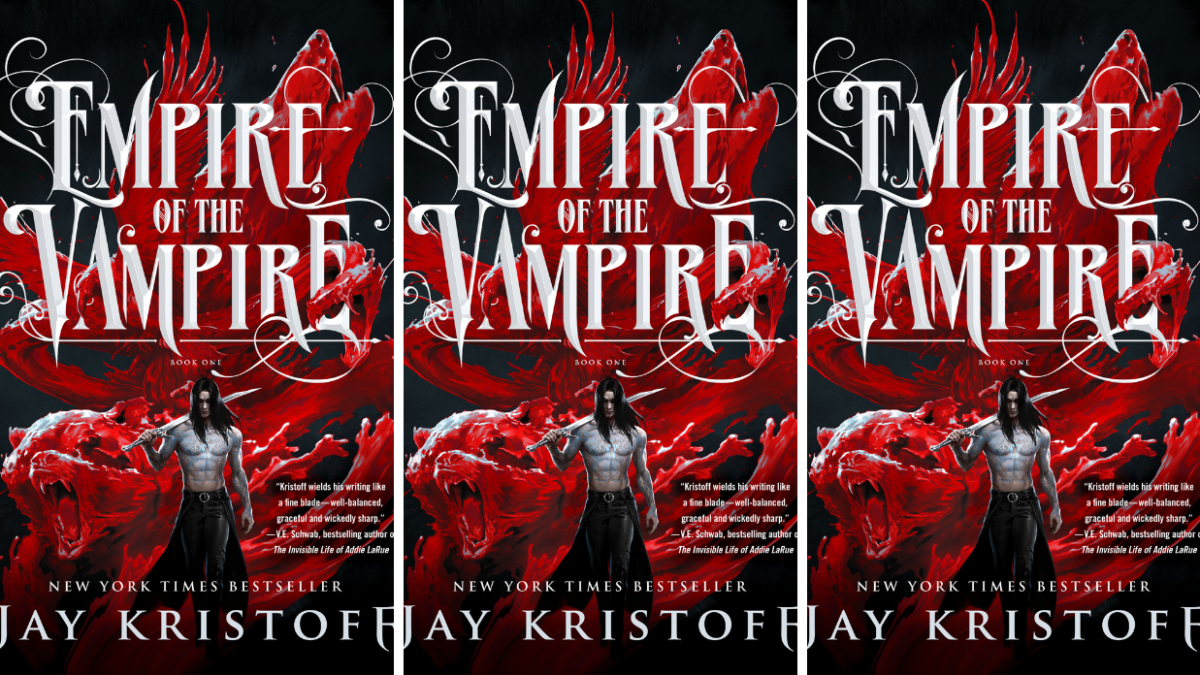Empire of the Vampire Makes Vampires Scary Again
We talked to author Jay Kristoff about embracing the horror of the vampire subgenre in his dark fantasy saga.

This article is sponsored by 
As a species, humans have more or less always been obsessed with vampires. (The earliest references to blood-drinking creatures date back to ancient Mesopotamia, believe it or not.) But the way we relate to these creatures has shifted throughout the centuries, as legends, folklore, and popular culture have adapted to the needs and fears specific to respective societies.
Published in 1897, Bram Stoker’s Dracula may have sparked a particular vein of horror story that continues to this day (looking at you, American Horror Story: Double Feature), but Anne Rice’s Interview with the Vampire, published in 1976, changed how audiences relate to bloodsuckers forever and plenty of contemporary vampire tales have continued to cast the creatures as broody, desirous, long-suffering anti-heroes burdened by the weight of immortality.
But don’t expect bestselling Australian author Jay Kristoff’s new book, Empire of the Vampire, to follow this modern trend. In this story, the first in a new epic fantasy trilogy, vampires are 100% terrifying again, vicious monsters who kill violently and indiscriminately, and whose powers mean that few humans are capable of standing against them for long.
“When I was a kid, vampires were the monsters under the bed. They were the scary things that were trying to eat the good people,” Kristoff explains during a wide-ranging conversation with Den of Geek. “I grew up reading books like Salem’s Lot and watching films like The Lost Boys and Near Dark. Those were the vampires that I grew up with.”
Those aren’t generally the sorts of vampires we tend to see in much contemporary fiction nowadays, however. From The Vampire Diaries and True Blood to the Twilight franchise, recent mainstream pop culture has embraced the idea of the vampire as a version of the ultimate bad boy boyfriend, a secretly romantic figure still searching for true love after centuries of loneliness.
“Over the course of the last 20, 30 years they have evolved into something very different,” Kristoff says. “[And] there’s nothing wrong with exploring that kind of vampire,” he adds, describing himself as a “massive fan” of The Vampire Diaries and firmly “Team Delena” when it comes to the love triangle at the show’s center.
“The cool thing about [the ‘vampire’ concept] is they’re a dozen different things to a dozen different people. You can have a dozen different vampire fans in the room, and they’ll all tell you a different reason why they like them, why they’re attracted to them.”
Though Kristoff may enjoy the world of The Vampire Diaries—he’s currently making his way through its spin-off The Originals—Stefan and Damon Salvatore were not the sort of creatures whose story he was interested in exploring in Empire of the Vampire. The novel is set in a kingdom where the sun has barely shone for nearly three decades, the dead walk during the daytime, and vicious vampire factions fight for control over the remaining human territories. Its world is bleak and frightening, and his vampires reflect that fact.
“I did want to make them monsters again,” Kristoff says. “I wanted to explore the way eternity and immortality would just warp you beyond all recognition. [How] it would make you inhuman.”
The author cites Rice’s aforementioned Interview with the Vampire as “the biggest influence” on this story. “I’ve loved that book since I was a kid,” he says. “And one of the strong themes that permeates that text is that nothing is forever. Everything goes away on a long enough timeline.”
Including the humanity of those who were once human. Kristoff’s novel includes something of a nod to Rice’s work, as the story is framed by our primary protagonist recounting the highs and lows of his life to a vampire historian named Jean-Francois, who is our first consistent glimpse into the removed, detached attitude with which these creatures view human beings.
“Over the course of hundreds upon hundreds of years, if you’re killing a person every night, you very quickly stop seeing people as people and start seeing them as food,” Kristoff explains. “That can’t help but affect your worldview and the way that you interact with it. I don’t think you could help but become inhuman …That’s really what the older vampires in this world are. They’re truly alien and truly monstrous. They look at us the same way that we look at the hamburger that we’re about to eat for dinner.”
Empire of the Vampire is not for the faint of heart. Clocking in at over 800 pages, this is a book bursting with darkness of both the literal and the figurative variety. From the cataclysmic event known as “daysdeath,” which literally darkens the sun to violent, to bloody battles between the living and the dead that lead to (multiple) heartbreaking deaths, this is not a story that’s here to coddle its readers or pull any punches, narratively or figuratively speaking.
“There’s only [redacted] named characters—as in major characters—left alive at the end of the book,” Kristoff teases. “Everybody else is dead.”
But as a result, Empire of the Vampire is also genuinely compelling, a rich, layered story that embraces real stakes and wrestles with complex questions about faith, belief, and family, both found and otherwise.
“It’s the biggest book that I’ve written. It’s definitely the hardest book that I’ve written,” Kristoff says, whose previous works include the Nevernight trilogy, another massive fantasy shot through with violence, corruption, and complex stakes. “Now that I’m at the tail end of it, [I think] it’s the best book that I’ve ever written. I’m more proud of this novel than anything I’ve ever written in my life, and that’s against some pretty stiff competition.”
Ostensibly, Empire of the Vampire follows the story of Gabriel de Leon, the last Silversaint, a member of an elite order of warriors who have sworn their lives to the Church in order to defend the world from the encroaching vampire plague. The novel is his reflection upon his own life, told from what feels very much as though it could be the end of it, imprisoned by the very creatures he was once charged with hunting.
Told in split narratives that look back at the beginning of his time as a Silversaint and his final desperate journey to save the world, Empire of the Vampire not only shows us a hero in crisis but one who has forgotten why he wanted to be a hero in the first place.
“[Gabe’s story] is two sides of the same coin,” Kristoff explains. “One, when he’s young and passionate and thinks all the world is good and bright and he can be a positive force in it. And the other one where he’s gotten old and realized that things don’t always work out the way they do in the storybooks.”
Though Gabe was once the sort of hero who tends to have songs written about them, by the time he’s recounting his great deeds to his vampire captors, he’s become more of a “fallen hero” whose story is primarily “about redemption, or at least a reclamation of faith.”
“Faith was something that was really important to him as a young guy,” explains Kristoff, “but terrible things happened to him over the course of his life and he lost his faith, as many of us do. Part of his journey, at least in Empire, is about finding something to believe in. He’s on a pretty destructive path at the start of the book when we meet him, and he’s 32. He doesn’t have a heck of a lot to live for. At least in part, his journey is about finding something that’s bigger than himself, that’s something more than the revenge that he’s driven toward…something worth fighting for.”
That something arrives in the form of a quest. Like so many before him in popular literature, Gabe ultimately finds himself on a search for the Holy Grail, a magical object that is rumored to be able to end daysdeath, and with it, the vampire plague. Whether the Grail is real or not is a spoiler that only those who read the book will find out, but Gabe’s search for it will quite literally change his life and expand the events of the second and third books in this trilogy in new and different ways.
In Empire of the Vampire, Gabe’s hunt for the Grail forces him to reckon with the darkest aspects of his own life as “ a lot of his own sins come back to haunt him.” As an example, Kristoff describes a later chapter in the book (it’s called “The Worst Day” for those who want to skip ahead) as “the hardest chapter I’ve ever written in my life.”
“I think some of the darkness that was happening in the world around me permeated my head and permeated the story,” Kristoff says of a scene in which, as you might have already guessed, something awful happens to a major character. “I wrote that scene and at the end of it I slammed the laptop shut and just pushed it away from me. I didn’t touch it for four days. I couldn’t bring myself to look at it. That’s the heaviest thing I’ve ever written. Even reading it back now, I’m like, ‘Damn, that’s really tough, you bastard.’”
Empire of the Vampire is just the first piece of what is shaping up to be a massive fantasy saga, and its second installment—which Kristoff says he’s writing right now—is set to expand the series’ world even further, introducing us to the matriarchal clans of the western Ossway as well as the dangerous vampires of the Blood du Voch, whose strength makes them especially difficult to kill. But, according to Kristoff, readers shouldn’t be shocked if the sequel turns our understanding of the story we’re reading on its head once more.
“One of the cool things [about Book 2] is you get a second POV. There’s another character that’s imprisoned in the tower and we get their version of events,” Kristoff explains. “You start to realize that maybe Gabe hasn’t been entirely truthful, or maybe he’s just viewing the past and certain people through rose-colored glasses.”
In other words: Buckle up. This adventure has only just begun, and plenty of Kristoff’s dark creatures are still waiting in the wings.
Empire of the Vampire hits bookshelves in the U.S. on September 14th, and in the U.K. a week prior. Find out more here.
